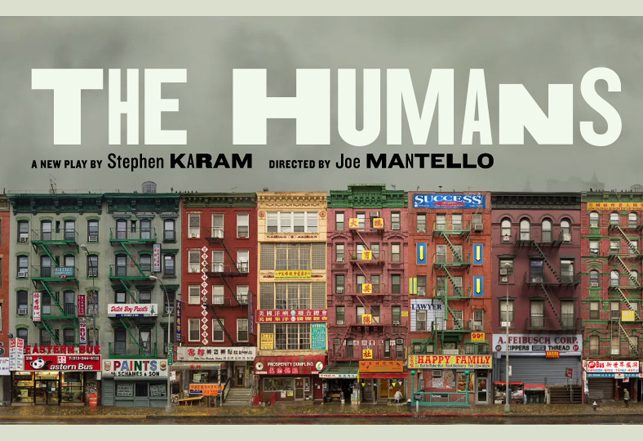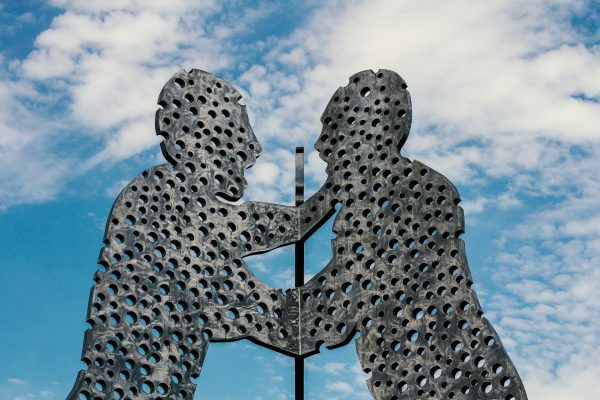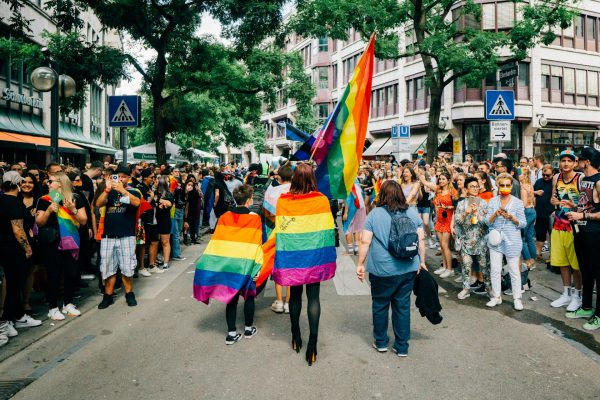Realism on the stage is nothing new. Audiences have been accepting it (and demanding) it since Ibsen and Chekov. Realism has been a standard for over a century now. It is has become accepted, almost boring even.
But “The Humans” by Stephen Karam (located at the Helen Hayes Theatre and directed by Joe Mantello) changes what “realism” means and makes audiences fall in love with it all over again. The play tells the simple story of a family getting together for Thanksgiving dinner: sounds basic, right? That’s the point. There is nothing overly dramatic, suspenseful, or show-offy about this show; there is no surprise twist; there is no intense climactic scene. The show begins as the family arrives for dinner, and it ends when everyone leaves. It is a glimpse at a few hours in the life of the Blake family.
The family is comprised of a small town, hard working father, Erik (Reed Birney), the overbearing saintly mother, Dierdre (Jayne Houdyshell), their recently broken-up lesbian daughter, Aimee (Cassie Beck), her struggling artist sister, Brigid (Sarah Steele), the boyfriend, Richard (Arian Moayed), and of course, the elderly, sickly, and mostly silent grandmother, Momo (Lauren Klein). Although there is no melodrama here, the family dynamics provide enough laughs, tears, fights, nagging questions, complaints, and conversations to keep the audience enthralled the entire time. Together the family must work through some conflict (even if they are just regular conflicts all families go through): a mother nagging her daughter to be more religious or get married, parents being concerned about their daughter’s awful apartment in Chinatown, a woman’s traumatic breakup with her ex-girlfriend, stomach troubles, Alzheimer’s, getting fired, getting rejected from grad schools, and extramarital affairs.
Seemingly, nothing happens. A family has a conversation for about two hours. There is some passive aggressive staring, a little bit a yelling, some tears, lots of laughter, and even a song. It is a new kind of realism, that shows what real life for a family is all about.
Even the stage itself helps transport the play into a new kind of realism. The set, designed by David Zinn, depicted a somewhat dilapidated apartment in Chinatown, basically empty (Bridig and Richard just moved in but are hosting Thanksgiving anyway). The apartment is two floors, separated by a spiral staircase–or an elevator for those less mobile like Momo. The space between the floors, as well as the entire proscenium, include exposed pipes, ventilation, and insulation. The set was literally a slice: not only of the Blake family’s life but of Brigid and Richard’s apartment.
Each actor gave an incredibly nuanced, emotional, and evocative performance; at times, it was hard to decide who to root for, who to be annoyed by, and who to feel bad for. Just like in real families, there was no “good guy” or “bad guy;” there was no “hero” or “protagonist.” Reed Birney played a troubled father, deeply upset that his adult daughters have moved away and unwilling to deal with his marital and economic troubles. Jayne Houdyshell gave a wonderful performance as the overly religious mother, who gave out Virgin Mary statues, discussed her saintly charity work, and constantly nagged her daughters about the sanctity of marriage. Cassie Beck brought almost the whole audience to tears, playing a devoted daughter who is deeply suffering: her girlfriend left her, her law firm refused to give her partner, and she is suffering from colitis. Sarah Steele, on the other hand, sometimes came across as a needy, entitled girl, unable to accept her lack of musical talent; at several points, however, she wooed the audience as she seemed crushed by her overbearing family. Even Arian Moayed gave a fascinating performance as the boyfriend, the only real outside, whose higher education level and economic status led to frequent conflict.
By the end, it was almost impossible to decide who was the focus. Brigid hosted the event, so often events seemed to swirl around her. However, the father, Erik, began and ended the play alone onstage, just thinking about his crumbling family. The mother, Dierdre also seemed to try to steal the spotlight, as so many mothers do. Both Aimee and Richard too competed for focus, since each subplot and conversation seemed more interested and pressing than the last–despite their simplicity and banal nature.
The play is nominated for 6 Tony Awards, making it tied for second most nominated play this season. Their nominations include Best Play, Best Scenic Design (David Zinn), Best Featured Actor (Reed Birney), Featured Actress (Jayne Houdyshell), Best Direction (Joe Mantello), and Best Lighting Design (Justin Townsend). “The Humans” gave Broadway a whole new kinda realism, and it seems like this is exactly what audiences were waiting for.






